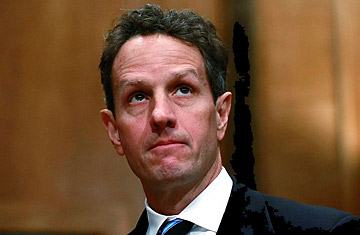
Treasury Secretary Timothy Geithner
The day after Timothy Geithner was appointed Secretary of the Treasury, about a month ago, Camden Fine got a call requesting his presence. The head of the Independent Community Bankers of America, a Washington-based association of thousands of small banks, was asked if he could meet Geithner the following day. When Fine showed up, he and an aide were escorted to the Secretary's office, in which sat Geithner and Gene Sperling, a former top economic adviser to President Clinton. The four talked for an hour. Fine spoke most of the time. Geithner took notes and asked follow-up questions. (See who's who in Obama's White House.)
At the end of the discussion, Geithner walked Fine out. Just before getting to the door of his office, as Fine recalls, Geithner looked at his watch and said, "I have been Treasury Secretary for less than 48 hours, and you are the first person from the banking industry that I have taken the time to meet."
First and last? Much has been made of the fact that Geithner specifically avoided getting input from the financial sector before announcing his plan to fix the nation's ailing banks. Indeed, representatives of the American Bankers Association and the Securities Industry & Financial Markets Association, which lobby for large banks and Wall Street firms, respectively, say they have yet to have sit-downs with Geithner. A number of industry insiders say Geithner's early-February policy speech, which got a poor reception, would have gone better and had more detail if he'd had more meetings with financial executives. Geithner, though, didn't want it to seem as if Wall Street was getting the chance to write its own blank check. (See pictures of TIME's Wall Street covers.)
But it appears that Geithner went out of his way to get the thoughts of the nation's 8,000 or so small banks. "We found it encouraging that Geithner wanted to know what was important to community banks," says Fine. He says that, since the initial meeting, his staff has had a number of subsequent meetings with Treasury officials.
It's unclear, though, whether Fine's special access will translate into financial help. Geithner has said he will spend a certain portion of the remaining $350 billion in the Treasury program formerly known as TARP investing more money in the nation's banks. But he hasn't said whether he intends to use the money to shore up the larger troubled banks or as grants to some smaller banks that don't necessarily need the funds but could use the additional money to make more loans. The government is reportedly in talks with Citigroup to take ownership of as much as 40% of that bank. But that stake may come not from an additional investment but from converting the government's existing preferred shares to regular common shares. (See the 25 people to blame for the financial crisis.)
Under the previous Administration, small banks complained they did not get the same access that large banks got to TARP funds. Some 600 small banks have filed applications to get financial-rescue funds, and they are still waiting for a response from Treasury. And that has driven up the resentment of large banks by their smaller competitors. "There is no future for the miserable eight," says Rusty Cloutier, the CEO of MidSouth Bank, a community bank in Lafayette, La., referring to the nation's largest banks. "No one is dealing with that. We can keep pumping money into them, but it isn't going to make it better."
The late-January meeting between Geithner and Fine could signal a change in policy. Some observers say that move would make sense. Bank analyst Meredith Whitney, who recently left Oppenheimer to start her own firm, has said the best plan to restart the financial system would be to give government money to smaller regional banks that could fill the lending void created by the pullback of larger ailing banks.
Of course, community banks, despite weathering the credit storm relatively well so far, may soon face their own troubles. Unlike larger banks, most community banks were not big in the residential-mortgage business. Instead, they made a lot of loans to local developers. As the economy sours, more and more of those loans are starting to go bad. Some analysts have predicted that as many as 1,000 banks could fail as a result of the nation's economic woes. Many of those banks will be of the smaller variety.
It's not clear how much of what Fine discussed with Geithner made its way into the plan that the Treasury Secretary announced in early February. Geithner offered only a broad outline of how he plans to spend the rest of his recovery funds. But community banks were probably pleased by Geithner's proposal to expand the Federal Reserve–funded Term Asset-Backed Securities Loan Facility to commercial–real estate loans as well as consumer credits.
"Our main concern is that all banks have equal access to government funds," says Fine.
